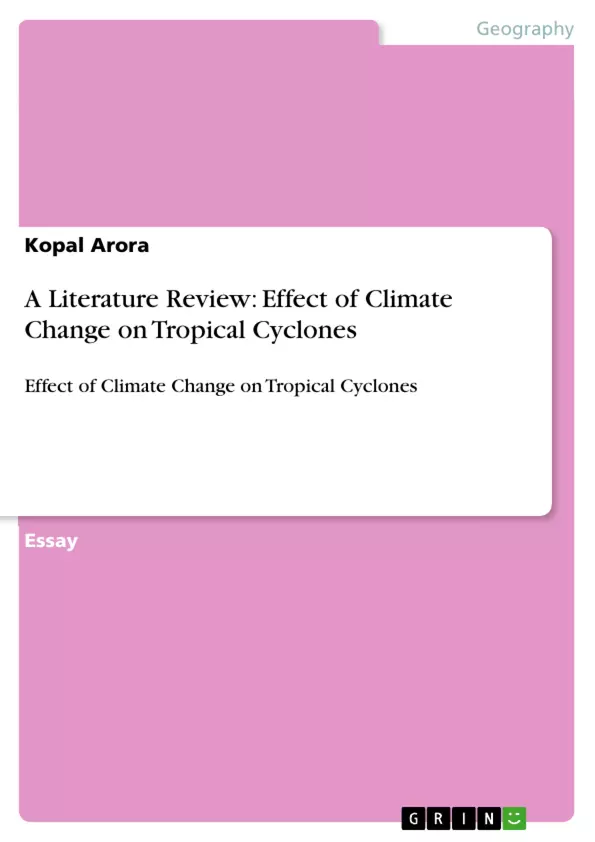Since tropical cyclones(TCs) are one of the major geophysical cause of loss of life and property, it is important to understand if there is any change in the frequency and intensity of TCs due to anthropogenic climate change.
IPCC considers 0.25-0.5 C increase in warming over tropical oceans over the past few decades due to increase in greenhouse gas concentration over past 50years.
During 6th International Workshop on Tropical Cyclones, a statement was released on the connection between the TCs and anthropogenic climate change. The statement was in response to the increase in number of recent high-impact TC events which includes, 10 land falling Tcs in Japan in 2004, 5 TCs affecting the Cook island in a five week period during 2005, cyclone Gafilo in Madagascar in 2004, cyclone Larry in Australia in 2006, typhoon Saomai in China in 2006, and violently active Atlantic TC season during the period of 2004 to 2005, including the catastrophic socioeconomic impact of Hurricane Katrina. A few recent articles [1] have noted a large increase in TC’s intensity, frequency and wind-speeds in some regions during past 5 decades, which could be attributed to the increase in the concentration of green house gases in past 50years. However, other studies explain this noticed increase as a result of better observations made and instruments used, making it easier to detect TCs.
Consensus statement by the International workshop on TC-6 reported uncertain conclusions about the influence of climate change on TC after taking into account evidence both for and against.
It was concluded that no TC could be solely attributed to the anthropogenic climate change. Model and theory predicts 3-5% increase in wind speed per degree C increase in SST. But, there is inconsistency between the small change in wind speed projected by theory and modelling versus large variations reported by some observational studies. Significant limitation of measurements over some regions make detection of trends difficult. It was suggested that if increase in SST continues, susceptibility to TC storm surge flooding would strengthen.
Inhaltsverzeichnis (Table of Contents)
- Introduction
- Main Part
- Arguments in Support of Climate Change Influence
- Arguments Against the View
- Conclusions
- Effect of Climate Change on Tropical Cyclones over Indian Ocean
- Arabian Sea and the Bay of Bengal
- North Indian Ocean
- Conclusions
Zielsetzung und Themenschwerpunkte (Objectives and Key Themes)
This literature review examines the complex relationship between climate change and tropical cyclones (TCs), specifically focusing on potential changes in their frequency and intensity. The review explores the impact of increasing greenhouse gas concentrations on TCs, analyzing both arguments supporting and refuting a causal connection.
- Impact of climate change on tropical cyclone frequency and intensity
- Analysis of arguments for and against the influence of climate change on TCs
- Exploration of the role of SST (Sea Surface Temperature) in influencing TC intensity
- Examination of the potential impact of climate change on TCs in the Indian Ocean
- Discussion of the limitations of current models and observational data in accurately predicting TC trends
Zusammenfassung der Kapitel (Chapter Summaries)
The introduction outlines the significance of understanding the potential impact of climate change on TCs, highlighting the destructive potential of these events. It discusses the observed increase in high-impact TC events and conflicting research findings regarding the link between climate change and TC activity.
The "Main Part" section presents arguments both for and against the influence of climate change on TCs. It examines studies that support the hypothesis of increased TC intensity due to rising SSTs and explores the use of models and indices like the Power Dissipation Index (PDI) to quantify potential changes. Conversely, it also discusses studies that refute this hypothesis, highlighting the lack of clear trends in TC frequency and the limitations of current models and data.
The section on the "Effect of Climate Change on Tropical Cyclones over Indian Ocean" specifically addresses the potential vulnerability of the Indian Ocean to TC intensification due to its unique characteristics and warming trends. It examines the available research on the frequency and intensity of TCs in the Arabian Sea and the Bay of Bengal, emphasizing the need for further investigation to understand the specific impact of climate change in this region.
Schlüsselwörter (Keywords)
Tropical cyclones, climate change, sea surface temperature (SST), Power Dissipation Index (PDI), Indian Ocean, hurricane, typhoon, model simulations, observational data, frequency, intensity, anthropogenic climate change, greenhouse gases.
Frequently Asked Questions
How does climate change affect the intensity of tropical cyclones?
Research indicates that anthropogenic climate change, specifically the increase in greenhouse gases, may lead to higher sea surface temperatures (SST), which are linked to increased tropical cyclone intensity and wind speeds.
What are the IPCC findings regarding ocean warming?
The IPCC considers there has been a 0.25-0.5°C increase in warming over tropical oceans in recent decades, attributed to the rise in greenhouse gas concentrations over the past 50 years.
Can individual cyclones be attributed to climate change?
According to the consensus from the 6th International Workshop on Tropical Cyclones (IWTC-VI), no single tropical cyclone can be solely attributed to anthropogenic climate change.
What is the Power Dissipation Index (PDI)?
The PDI is an index used by researchers to quantify potential changes in tropical cyclone activity and intensity over time, often used in studies analyzing the impact of rising SSTs.
How is the Indian Ocean specifically impacted by cyclone intensification?
The Indian Ocean, including the Arabian Sea and the Bay of Bengal, is considered particularly vulnerable to cyclone intensification due to its unique warming trends and geographic characteristics.
What are the limitations of current tropical cyclone data?
Significant limitations include inconsistencies between theoretical models and observational studies, as well as measurement difficulties in certain regions that make it hard to detect long-term trends.
- Arbeit zitieren
- PhD Kopal Arora (Autor:in), 2011, A Literature Review: Effect of Climate Change on Tropical Cyclones, München, GRIN Verlag, https://www.grin.com/document/274134



